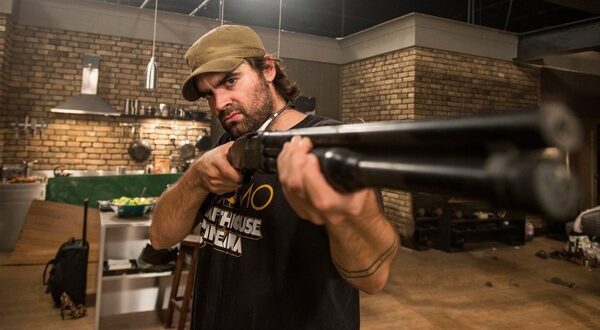I waited, pretty impatiently, for Joe Lynch’s new flick, Suitable Flesh (read our review HERE), to finish playing the festival circuit. The highly anticipated film boosting an amazing cast (Heather Graham, Barbara Crampton (read our interview with her HERE), Judah Lewis, Johnathon Schaech (read our interview with him HERE), Bruce Davison) and based on an H.P. Lovecraft story, was slated for Shudder fairly early in the year, and man. That wait was looonngggg. But the time is finally here, and Suitable Flesh is now available for the masses to consume at their leisure.
A psychiatrist becomes obsessed with one of her young patients, who she later discovers is linked to an ancient curse.
To celebrate the release of the film, I chatted with director Joe Lynch (Mayhem – 2017) about how he came to direct the film, Barbara Crampton and casting the film, horror movies, and more!
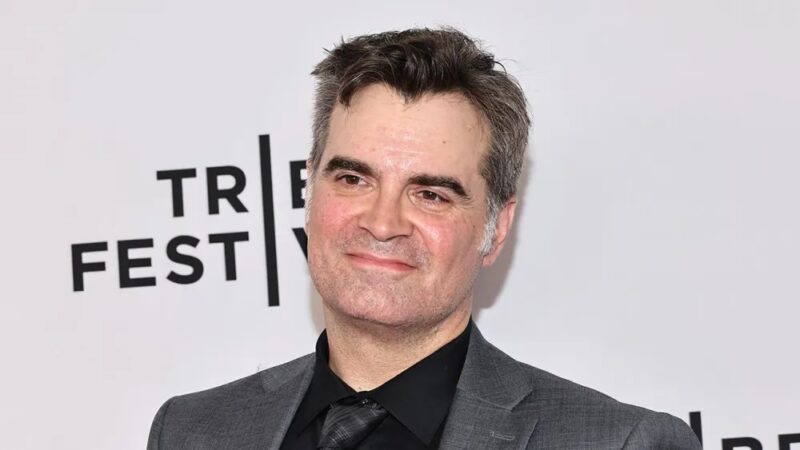
PopHorror: I’m really excited to speak with you! Suitable Flesh was so much fun.
Joe Lynch: I’m really thrilled to dive into this. It’s a very exciting time because now we’ve done the theatrical release, it’s been on VOD, now it gets to come home to Shudder, so everybody gets to enjoy it. Let’s dive in!
PopHorror: What intrigued you about the script and made you want to be a part of the project?
Joe Lynch: Well, the main thing that intrigued me about the script was that I knew what this project was for years. Funny enough, I do this podcast called The Movie Crypt with Adam Green, and we were going through old episodes, and we found this one with Brian Yuzna, the producer of Re-Animator, From Beyond, the director of Society, also the executive producer of Suitable Flesh. I had mentioned to him, “What Lovecraft adaptation do you still want to do?” He had mentioned – this was back in 2019 – The Thing on the Doorstep and then I’m pretty sure I had met up with Stuart (Gordon – director of Re-Animator – 1985) at one of the Masters of Horror dinners, and he was talking about it. As a fan of both Brian’s but especially Stuart’s, to know that Stuart was going to go back into Lovecraft County, so to speak, and do another kind of adaptation with Dennis (Re-Animator co-writer Paoli), with a lot of the gang back together, just as a fan I was enthralled. I was so intrigued. I knew about the story so I’m like, that’s perfect fodder for that team to get the band back together, so to speak. And then unfortunately we lost Stuart in 2020. Then a couple months later, Barbara Crampton – our good friend Barbara Crampton, who I had become friends with but not on the level that I am today but casual, if you will – she had sent me the script. And again, as a fan, I didn’t even fathom that I would be directing this film. They had mentioned it, but I was just like, as a fan I want to read it. And I did, and I was really excited about it, but at the same time, knowing the current purview of what was going on in 2020 and even today – the culture wars that have changed, the gender situation that we were in where the male gaze wasn’t quite the same as it was in say, the 80s and 90s when erotic thrillers and horror films that use sexuality were kind of at their heyday, and I love the idea of this. I’m a big fan of body swap movies, but what if we tried something a little different? Something, at least at the time and it shouldn’t have been progressive, but something that was progressive where we took a female gaze perspective of this. Because to be totally honest with you, Stuart Gordon was one of those, to me, those OG provocateurs in the genre. He was doing things with sexuality and gender, and sexual fluidity that I had never seen before. And I thought, in a weird sort of way, what would Stuart do in this situation? And that felt like the right thing to kind of put it on the course for it being that kind of provocative genre cinema that I knew from this team, thinking they’re never going to go for this. Shockingly they did and that was that.
PopHorror: Did you feel any pressure bringing to life a piece of work based on Lovecraft.
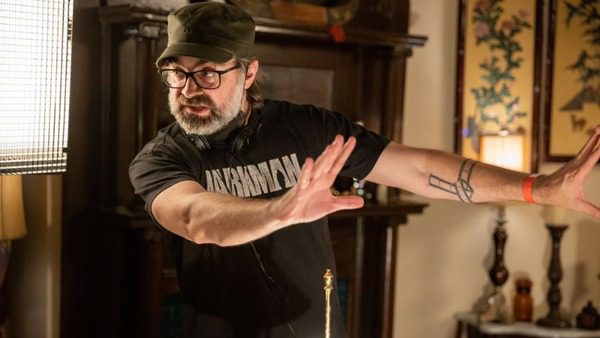
Joe Lynch: Of course! Oh my god. I was terrified, to be honest. I honestly thought when I sent that email out… Because my writing partner and I came up with this eight-page document on exactly why we wanted to do this, all the reasons why it wasn’t just a “flip the genders because it was the cool thing to do at the time.” We had a point. We had a vision for it. I honestly thought, well they’re never going to respond to that! And they did, and that is where the terror set in where I’m like, oh shit, I’ve gotta do this now. Like I had to do it because I was a fan of Lovecraft’s work obviously. I mean, Re-Animator’s the movie that made me go, “Who is this H.P. Lovecraft guy?” That set me off on a huge path on getting into cosmic horror and getting into Cthulhu and all that stuff we all know and love Lovecraft for. But also, Stuart’s work. Stuart was, and still is, one of my heroes. He’s one of those directors that you could in one breath say, “Here’s the director of Re-Animator and From Beyond, but also Space Truckers, and Robot Jox, and The Wonderful Ice Cream Suit. He was one of those genre-hoppers that I always wanted to be. I hated that certain directors were kind of typecast in one genre. Stuart kind of said, “F you,” to all of that and would do his own thing, whether it was gigs or whether it was passion projects, he never seemed to stay in one place. I wanted to honor that, especially since I had just come up with a kind of a big Netflix action movie. I wanted to do something completely different. But that comes with its own set of anxieties and terrors and knowing that right when we set off and were developing the script in this new way, I really wanted to infuse and literally shove it into the Miskatonic universe that Stuart, and Dennis, and Brian, and Barbara had all cultivated. I knew I wanted this to be in that world. And if you do that, it’s kind of like doing a Star Wars movie in a way where it’s like, okay I’ve now created this to be part of this particular canon. It’s going to get compared to all of those movies no matter what, so I might as well go full force and dive right into that Miskatonic-verse, and shockingly and thankfully, just based off of the reactions we got from our first festival screening at Tribeca, all the way up through the theatrical release and the Blu-ray, it seems that people have really responded to that. Look, I know the movie’s not for everybody. It’s going to have its haters. Every movie has its haters. But I feel like the best compliment I could have gotten from this was in so many reviews, people would say, “Stuart would be proud.” Knowing that, then I feel like I did my job.
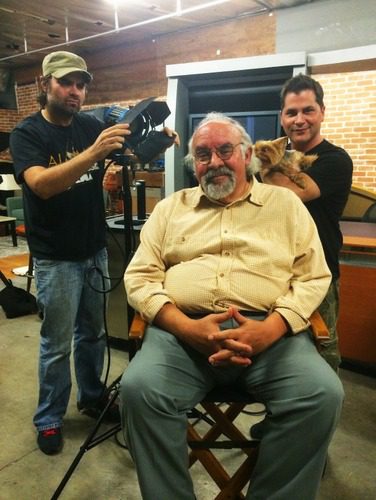
PopHorror: Aww, I love that. The buzz for this movie is so big. I posted that I was watching it in preparation, and just the amount of people saying that they can’t wait to see it… People are excited.
Joe Lynch: I think there’s a lot of love for Re-Animator, and From Beyond, and Stuart’s work in general, Dagon… And even just Lovecraft in general, like The Cabinet of Curiosities that came out last year that del Toro cultivated. I think that there’s a want and a need for not just cosmic horror, but also sexuality in films not being so cuckooed as it’s been for the last couple years, where people are saying things like, “Oh, that character didn’t have consent to being in a sex scene.” They’re a fucking character, pardon my French. That’s ridiculous. If you are into these types of movies, I think you’re going to be very happy. If you’re into these movies and you might not like horror but you like erotic thrillers, maybe you’ll be into it. If you like erotic thrillers but maybe not into body horror stuff as well, hopefully there’s something for everybody. So far, knock on wood, it’s been going pretty well.
PopHorror: Body horror, erotic thriller, horror… You hit it all for me, so thank you.
Joe Lynch: Yes!
PopHorror: I think one of the reasons this film has such a big buzz is because your cast is amazing. People love Barbara. What was your casting process like?
Joe Lynch: The casting was very interesting because once I signed on to be the director, and when we got our casting director and everything, the wheels were really turning. Thankfully, I’ve done enough work in the past where it’s easier for casting directors to point to movies like Mayhem. I mean, Steven Yeun just won an Emmy and a Golden Globe, and I had him in one of his first theatrical films. Looks great for me. But having actors like Salma Hayek and Anthony Mackie, that level of talent is really good to mitigate any fear that certain actors have, especially when the subject matter can be a little more avant garde or a little bit more edgy. But it still was an erotic thriller, something that people haven’t really been doing lately. So we went through many lists of actors, actresses, who we thought would be perfect for the role, plus I also had a lot of… Not pushback but a lot of scratching heads over the idea that we didn’t want this character to be in her late 20s, early 30s. We wanted to deliberately lean into this person – both leads – being a little bit older. That kind of, obviously, shrunk our list a little bit of actors who would viably be able to get the film financed, but at the same time, I think people were a little like, “Do you really want to go there?” And we were like, “Absolutely!” Women in their 30s, 40s, 50s, are incredibly sexy. I always grew up hearing a woman’s sexual peak is their late 30s. I’m like, awesome! Why aren’t we representing that? And it also made sense that you would have a woman in her late 40s, early 50s, be this acclaimed author of many books and have her reputable therapy profession. All of these things made sense. And then look on the flip side and like Barbara was getting criticism left and right when she was in her 20s playing a doctor in From Beyond. She was like, “This is how we right the wrong here a little bit” Ultimately, it was Barbara’s idea to bring it to Heather Graham, and I was like, “Oh my god. I love Heather Graham. So many people know Heather Graham, but a lot of people know Heather Graham from a lot of her more comedic stuff like Boogie Nights. But people forgot she was in movies like Drugstore Cowboy, or Twin Peaks, where she was doing much more dramatic stuff and even genre stuff. I also knew she was comfortable, pardon the pun, in her own skin, in her own flesh. It only took, honestly, a ten-minute Zoom call – at least ten minutes into a very long Zoom call with her – for both of us to say, “I think we’re both on the same page here.” So, once we got Heather, once Heather felt comfortable with me and my direction for this and my vision for it, everything else fell into place. Johnathon Schaech had always wanted to work with Heather and they’d always kind of passed ships in the night in the 90s and the 2000s and other projects. I had just worked with Johnathon and he’s an incredibly sexy person, but he also liked the idea that I was taking this from a female gaze. If you look at the paradigm for film noir, you have your hapless protagonist that’s usually male, you have your femme fatale that’s usually female. We made it a homme fatale, if you will. But then you also have the doting wife that can do no wrong and is always there to support the protagonist but ends up becoming somewhat of an innocent victim, so to speak. He loved the idea that he got to play the housewife, so to speak. So he was in. Bruce Davison had known Barbara for years. She was, at the time, only producing the film, but he was like, “I’m in!” Judah was actually a really difficult thing to find. In terms of the part of Asa, we looked at so many audition tapes and then someone had mentioned Judah. I knew Judah because Samara Weaving from Mayhem had extolled his virtues when she worked with him on The Babysitter, “I’ve gotta look out for that kid!” And I had seen him in The Christmas Chronicles and stuff, and I saw him in Summer of 84, but I never thought in a million years he would be into this. And then again, it just took a very long three hour rap session with me and him. At first, I didn’t even have him read until the very end. He wasn’t even supposed to read for the part, but we found a mutual appreciation for similar movies like Linklater and stuff. Once they saw what I was going for, he was in as well. Barbara was the last person that we cast, mainly because at first, she didn’t want to be in the movie. Not because of the quality of the film or whatever I was going for, she just wanted to produce. She wanted to take a break. Then she saw the cast and went, “Aahh, I really want to have fun with you guys,” so she was in. It’s one of the processes that once you get your number one on the call sheet, so to speak, once you get that first person in, it feels like everyone else kind of falls into place or they see like, “Well, if she’s in, then I’m in,” “If he’s in, then I’m in.” And all the dominoes just kind of fall into our favor all from there, and we were totally blessed.
PopHorror: As someone in her 40s, I want to say thank you for casting older actresses. I appreciate that because we do want to ourselves, or people our age, more in the forefront. And Heather Graham hasn’t aged in years. She still looks the same as she did in License to Drive.
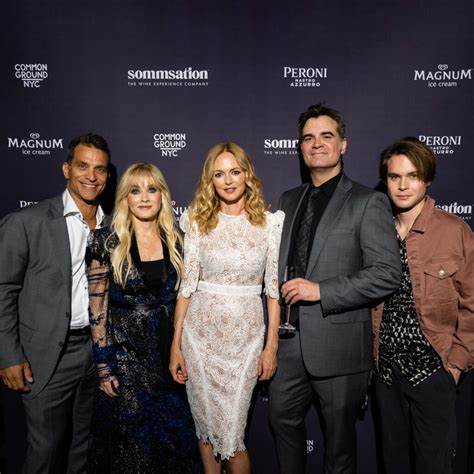
Joe Lynch: Right? Because I even would tell her that I had a huge crush on Mercedes back in the License to Drive days, and she’s like, “Oh, stop, stop.” I’m like, “What’s your secret?” and she’s like, “Well, I have this painting in my attic like Dorian Gray and that’s what’s been aging for decades now.” That’s not true. I think also, there’s something to be said about both her and Barbara. When you present them with characters that they fully encompass themselves with. They have a certain glow to them, and once we were really in the trenches together, there was something so playful about this part that really kind of pushed all of Heather’s buttons, I’d say, where she was kind of pushed outside the normal boundaries of what she’s comfortable with. She was always comfortable with everything. Like you could tell she was having so much fun, and when that kind of fun gets captured on camera, it can’t not be conveyed to the audience so I’m glad that she enjoyed the experience and from what it sounds like, everyone loves seeing her in this performance. Hopefully she does more horror from here. I really hope so.
PopHorror: Yeah, absolutely. The horror genre has evolved over the years and has become a box office powerhouse. Why do you feel so many people connect with horror?
Joe Lynch: Well, horror is that vessel of safe danger. We have so much real horror in our life right now going on, that it is always nice to take something that would be considered a visual cautionary tale and apply ourselves to it whether we want to react to them or we want to put ourselves in their shoes. But by doing that, it allows us to have that safe space where we can go, “Glad that’s not me! I’m out.” And also, to be able to convey certain things, certain ideas, certain fears that we all have, and be able to compartmentalize it into a two hour or 87 minute or even longer, like a long form series like a Flanagan short series like Fall of the House of Usher. To be able to put that into a bucket, and to be able to enjoy it, but also be able to step away and go, “Okay, that’s not me!” is really cathartic for a lot of people. That’s where I think horror has always been a reflection of our times. There’s a great documentary that came out years ago called American Nightmares that pinpoints certain films and how they were reflective of the times, starting with Night of the Living Dead, but then going into fear, the youth, and sexuality with Halloween, and then into the 80s there were certain films that reflected the times that we were in. I think that good horror always knows how to tap into the fears and anxieties that we have as a collective culture and prey on that a little bit, but also do it where you can step back from it and go, “Thank god that’s not me!”
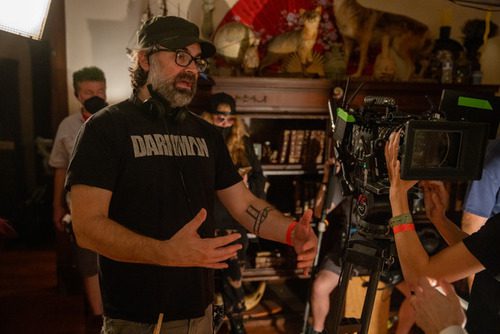
PopHorror: I agree 100%. I have just one last question for you today. What is your favorite scary movie?
Joe Lynch: Ooh, god. It always changes. I always try to veer away from the normal ones, The Exorcist is a perfect example because everyone knows The Exorcist, and still to this day, it still terrifies people. Lately though, I’ve been on more of a realism kick, and I know this probably not a movie that people would constitute being a horror film, but there’s this film that came out in the early 80s called Come and See. It’s a Russian film that’s about World War II and the atrocities of World War II. I had never seen it, my wife had seen it before. I’d heard from so many other people, “Oh, this is the most terrifying movie of all time!” And I’m like, how can that be? It’s not on any horror movie lists at all, and yet I watched it, and I was truly horrified. Not just by what was going on on the screen, but by how it was presented. It was truly riveting in the most terrifying sort of way. Now that said, recently I just watched The Omen again, Richard Donner’s The Omen. I had grown up with the Damien saga. I had actually seen Damien: Omen II before the first one, so I knew full well the whole storyline. There’s something to be said about the atmosphere that Richard Donner creates in The Omen that is absolutely terrifying at times.

Thank you so much to Joe for taking the time to speak with us. Suitable Flesh is now available on Shudder!
 PopHorror Let's Get Scared
PopHorror Let's Get Scared
